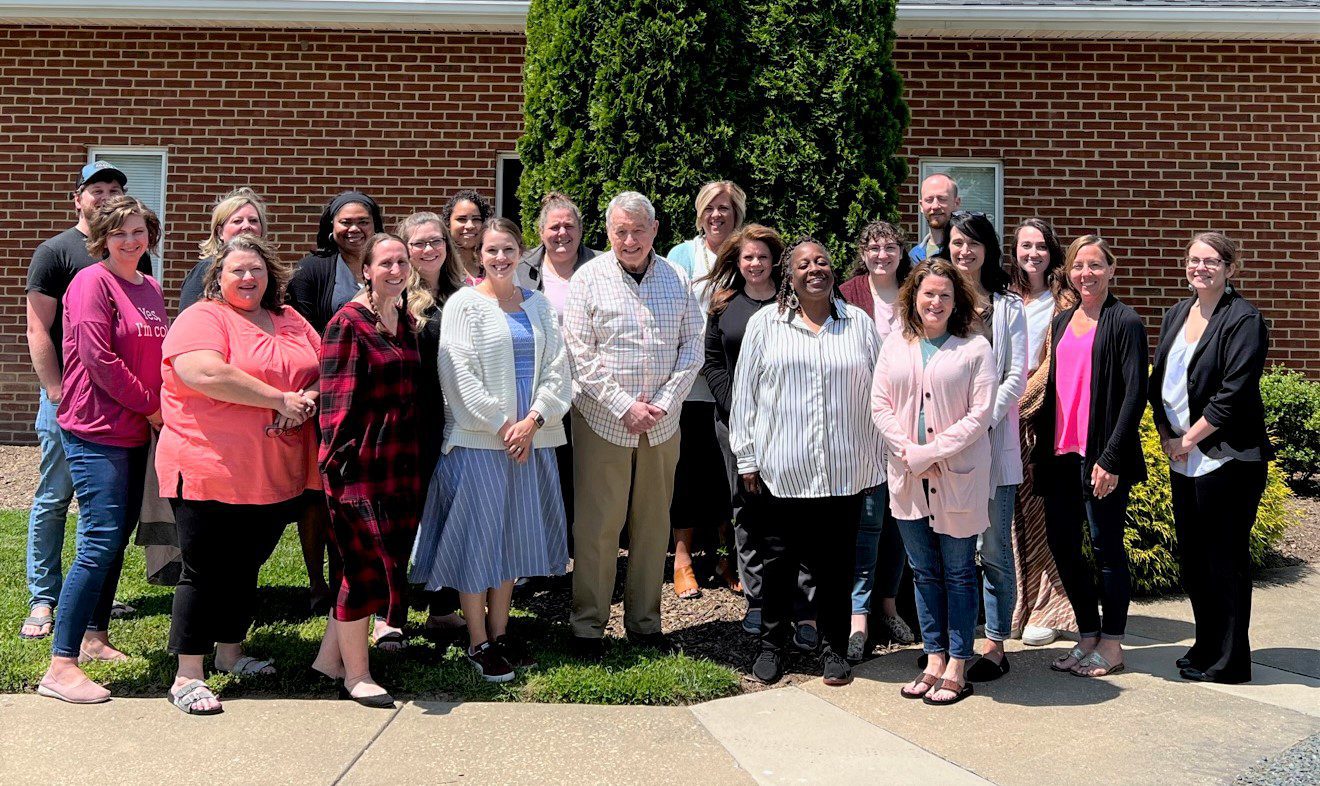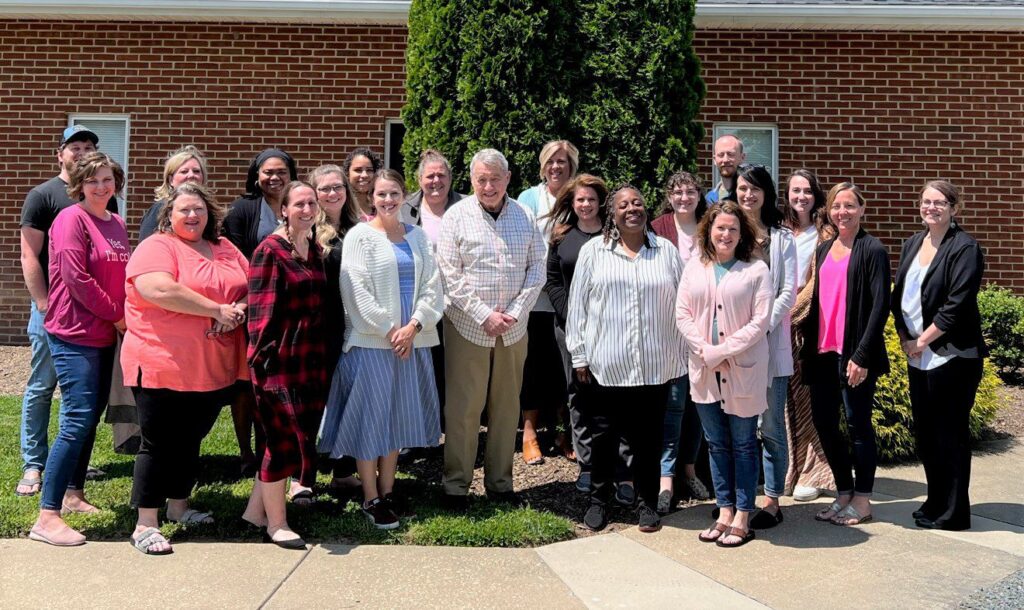In the News

Mid Shore Behavioral Health Offer Dyadic Developmental
Children who have been hurt and/or neglected within their families in their early years of development can be traumatized by these experiences and find it difficult to feel safe and secure within their families. This is sometimes called developmental trauma. To help local therapists have the tools they need to deal with this trauma, For All Seasons’ Center for Learning, in partnership with Mid Shore Behavioral Health, Inc., recently offered a training program in Dyadic Developmental Psychotherapy (DDP), taught by the founder of the DDP modality, Daniel A. Hughes, Ph.D. on May 17-20, 2023. Twenty participating clinicians from across the Shore participated in four days of experiential training, which will increase the region’s capacity to serve and support youth and families affected by early childhood trauma.
The training was implemented by For All Seasons, Inc. with generous lead funding from the Talbot Family Network, Talbot County’s Local Management Board. Additional supportive funding came from Mid Shore Behavioral Health, the George B. Todd and Reynolds/Cristiano Funds of the Mid-Shore Community Foundation, and Worcester County’s Initiative to Preserve Families.
Dyadic Developmental Psychotherapy (DDP) is a treatment approach to trauma, loss, and/or other dysregulating experiences. DDP is based on principles derived from the theories and research of attachment, attunement, and the knowledge of trauma and interpersonal neurobiology. Dr. Hughes, a clinical psychologist from South Portland, Maine, founded and developed DDP. This psychotherapy treatment occurs in a family setting, with caregivers and youth working side-by-side to form healthy attachments.
According to Beth Anne Dorman, President and CEO of For All Seasons, studies have shown that COVID’s isolation measures negatively impacted healthy attachments, especially for lesser-skilled, under-resourced parents.
“Children who were already at risk for the effects of insecure attachment were negatively impacted during the lockdown because they were unable to sustain the healthy attachments they had with adult figures at school and in the community. This was particularly true for adolescents who experienced social disconnection from peers during COVID, even if they had secure/healthy attachments to parents, because of the critical developmental need for peer attachment during this age range,” she explains.
“DDP is conversational and involves both the child and the parent. It’s based on attachment principles whereas many other therapies are not. These principles, I think, are basic to human nature. Children who are successful in life have secure attachments to their parents. If a child has been traumatized by parents early in life, they have to learn how to trust parents who are now taking care of them,” Dr. Hughes comments.
“A child may struggle with attachments, not necessarily because they experienced child abuse, for example, but because of stresses in the family. These could be related to family moves, changes in employment, or a divorce. There may also have been intense relationship stresses the child has had to deal with which have undermined their ability to feel safe.”
Participants of the training learned from recorded therapy sessions Dr. Hughes had done in the past with families. He also shared case studies of families whom he worked with and described some of the interventions, responses, and dialogues had with families. For nearly 40 years, this model has been used by therapists throughout the United States and Canada, as well as countries in Europe, Australia, and New Zealand to help children and youth reach their full potential and reconnect with others in their lives.
“I developed the model because I didn’t think the therapy models being used at the time were very effective in treating real traumatized kids. I then developed a model based on attachment research and theory because the other models were not based on this,” Dr. Hughes states. “For All Seasons Center for Learning is delighted to offer this training program to reach youth-serving mental health clinicians across the Eastern Shore, with a focus on Talbot County, who can make an impact on bettering the lives of youth and families in our communities. The youth and families affected by attachment disorders and trauma have had very few options for mental health clinicians trained in treating attachment and trauma disorders. This training program aims to remedy that problem by building a robust network of mental health clinicians who are equipped to provide attachment-focused care,” adds Lauren Weber, Vice President for Philanthropy and Education at For All Seasons.
“While the four-day training took place over four days in May, this cohort of participants will continue to meet monthly over the next six months to continue their DDP learning journey and ensure that each is fully supported in applying what they learned from Dr. Hughes. During this time and after, our partners Mid Shore Behavioral Health will continue coordinating referrals for care to this new broader network of attachment-informed mental health providers.”
For further information about For All Seasons Center for Learning and its educational programs, contact Lauren Weber, Vice President for Philanthropy and Education at For All Seasons at lweber@forallseasonsinc.org or call 410-822-1018 or visit forallseasonsinc.org. For information about DDPI visit the website www.ddpnetwork.org.
For All Seasons provides the highest quality mental health and victim services to children, adults, and families across Maryland’s Eastern Shore. Services are offered in both English and Spanish and include therapy, psychiatry, victim advocacy, 24-hour crisis hotlines, outreach, and community education. For further information, contact For All Seasons at 410-822-1018 or visit forallseasonsinc.org.


Captions:
#1: Pictured left to right are clinicians who participated in a training program recently held in Easton in Dyadic Developmental Psychotherapy (DDP), sponsored by For All Seasons’ Center for Learning, in partnership with Mid Shore Behavioral Health and with grant funding from the Talbot Family Network.
#2: Picture are three participants in the DDP training program role-playing to help practice skills learned during the training.
